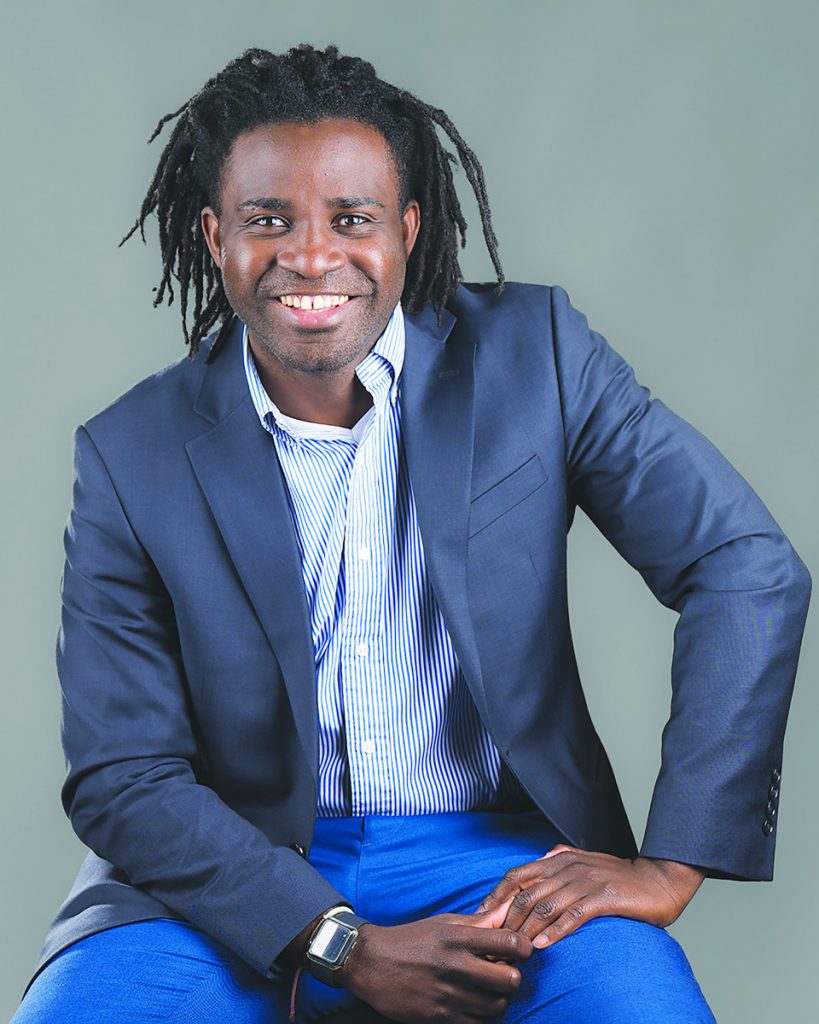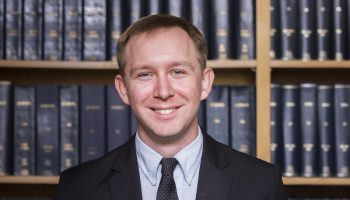Embedded within each of Chautauqua Institution’s four pillars — art, education, recreation and religion — is the fundamental concept of reading.
Reading is essential for identifying a painting’s title, grasping the significance of (mis)information online, studying The Small-Boat Sailor’s Bible to pass a skipper’s test, transforming a musical score into evocative sounds, and familiarizing oneself with sacred texts.
“What YOU Should Read This Summer!” is the topic chosen by the Chautauqua Women’s Club for the first presentation in its Chautauqua Speaks series.
At 9:15 a.m. on Thursday, June 30, at the CWC House, Scott Ekstrom, author and director of Smith Memorial Library, and Sony Ton-Aime, a Haitian poet, essayist, translator and Michael I. Rudell Director of Literary Arts, will share some recommendations. Given their unique experiences and qualifications, this is also an opportunity for them to delve into multi-disciplinary, cross-cultural and even existential aspects of reading.
Sony Ton-Aime

“I was always interested in reading, and still am,” said Ton-Aime, who grew up in Ouanaminthe, Haiti, where his family continues to live. “I was very shy … (and) always comfortable when I had a book. My mom was proud that I was a reader. She’d always say, ‘Go to sleep, you’ll damage your eyes.’ ”
For Ton-Aime, books were a way for him to grow and to escape.
“I love the idea of reading,” he said. “I devoured books. I wanted to go places, and living in Haiti, reading was a way of going places.”
Reading took him to faraway Paris, Barcelona and Budapest — around the world.
Although it wasn’t until sixth grade that Ton-Aime began writing, by ninth grade he was the editor of Tout Feu, Tout Flamme, his high school’s literary arts magazine.
“I kept writing, mostly poetry, but also stories and plays,” Ton-Aime said. “My senior year, I was awarded a scholarship to Kent State (University) for college.”
Because he couldn’t speak English — his native language is Haitian Creole and he was fluent in French — Ton-Aime arrived in Kent, Ohio, a month ahead of most students. He said that he and other international students spent August and their initial fall semester learning English as a Second Language to prepare for the Test of English as a Foreign Language. Once they had passed, they could effectively pursue their degrees.
“It was so important for me to take ESL, because … all the people were in the same situation,” Ton-Aime said. “We bonded over the ability to speak (English). We formed a community and continued taking classes together and staying in the U.S. It’s not only learning the language, but also having people to speak with.”
Moreover, his ESL community took advantage of the opportunity to learn about each other’s cultures.
“That’s where my reading helped,” Ton-Aime said. “I had read books from their countries. … It’s a sense of curiosity that I believe reading and writing (gives) us.”
From Ton-Aime’s viewpoint, reading isn’t pretentious.
“It’s coming from a place of caring: an opportunity to learn and to teach, and to pass on knowledge,” Ton-Aime said. “It’s important for our survival and the survival of passing down genes. It’s a way of keeping our culture and history alive. It’s a human thing to pass down our knowledge.”
At first, Ton-Aime took mainly math courses. He studied accounting and completed the requirements to major in business administration. It wasn’t until his final semester at KSU that he was able to take writing courses.
Ton-Aime graduated in 2014 and returned to Haiti, where he worked as the accountant supervisor for a manufacturing firm that made handbags and lunch bags. Writing, however, was so important to him that after he left work for the day, he went home and wrote.
In 2016, Ton-Amie applied for KSU’s Master of Fine Arts program, and simultaneously informed his company that while he loved working for them, he couldn’t stop writing, so he couldn’t continue there. Happily, KSU accepted him.
As a graduate fellow at the College of Arts & Sciences’ Wick Poetry Center, which is one of just 10 American poetry centers, and the only one with an extensive range of local, regional and national activities, Ton-Aime honed in on English poetry.
“I do believe that if you study anything in a language you have to master, it should be poetry,” he said. “Poetry gives you the opportunity to reimagine a completely different word, and a completely different language, as well. I speak English, but the English I speak is my English.”
While speaking with Chautauquans, Ton-Aime is actually making up a language.
“I am translating from Haitian Creole to French to English. The language (Chautauquans) get is an amalgam of those languages. It is not fully Haitian Creole, French or English,” he said. Although at times he makes mistakes, he said that poetry allows for that.
“We do not come to poetry as a way to understand. We come to poetry to question our beliefs, but also to see things in different ways,” Ton-Aime said. “And that’s why I can share a poem with everyone and we will have different interpretations.”
While he was pursuing his MFA, Ton-Aime went to elementary schools, high schools and prisons as part of Wick’s award-winning Traveling Stanzas project.
“I wanted to participate in everything,” Ton-Aime said. “There was this professor at Kent State in sociology, Christopher Dum; he had a grant for the Lake Erie Correctional (Institution) in Conneaut (Ohio), and he asked if anyone would like to go and teach poetry. I said, ‘Yes.’ ”
In 2017, the weekly sessions led to the decision to publish the inmates’ work as a series of chapbooks titled ID13. Ton-Aime, an ID13 co-founding editor, said that “ID” represented the prisoners’ practice of signing their poems with their prison identification numbers rather than their names. “13” refers to the 13th Amendment of the U.S. Constitution, which abolished slavery “… except as punishment for crime whereof the party shall have been duly convicted …”
“Prisoners can be treated as slaves,” Ton-Aime said. “I’ve moved on, but ID13 is still going on. Some of the prisoners are out now and writing books.”
A former inmate who contributed his work to ID13 participated in the June 2022 Chautauqua Writers’ Festival; ID13 chapbooks were included in the materials provided.
Moving on for Ton-Aime meant completing his MFA in creative writing and poetry, representing the Wick Poetry Center after Chautauqua Institution initiated a relationship with Kent State, and writing LaWomann, a chapbook published in 2019 by Ironworks Press.
During the 2018 and 2019 seasons, Ton-Aime managed Wick’s Traveling Stanzas exhibit, housed in Chautauqua’s Poetry Makerspace. He also worked as a liaison for writers-in-residence at the Chautauqua Writers’ Center and served as a mentor to the Center’s literary arts undergraduate interns.
Ton-Aime then joined the staff of the Cleveland-based, youth-oriented literary arts organization Lake Erie Ink as program operation coordinator. While on staff he produced the Haitian Creole translation of the book Olympic Hero: The Lennox Kilgour’s Story, and co-developed the Haitian Creole course on Duolingo.
In January 2020, shortly before the emergence of the COVID-19 pandemic, Ton-Aime became the Institution’s director of literary arts and then, in 2021, the Michael I. Rudell Director of Literary Arts
Among other publications, his work has appeared and is forthcoming in Artful Dodge, La Revista PingPong, The Oakland Review, Dunes Review, Poets.org, The Idaho Review, Hunger Mountain Review and Cleveland Review of Books.
Ton-Aime said that on Thursday he’ll share book recommendations and talk about the importance of reading at Chautauqua.
“Chautauqua is the ideal place,” he said. “It was made, really, for reading. … (Chautauqua’s) founders put together a lifelong project that for almost 150 years (has been) sustained through reading.”
Scott Ekstrom

Beginning his eighth season and year as the director of the Smith, Scott Ekstrom is also keen on venturing beyond summer book suggestions, in part by addressing FAQs about the library such as: How he decides which books to buy, and, given space limitations, which books to remove from the library’s collection.
“I might approach the topic a little ironically — how do you decide what to read?” Ekstrom said. “I’m interested in that and in what motivates people. Professionally, I love recommendations because Chautauquans are such discerning readers. … So many people (here) are connected to the written word.”
What’s new at the Smith — including Kanopy, the library’s free streaming service — is a topic that Ekstrom thinks will be of general interest.
“We have just been trying out (Kanopy) this spring, and it will soon be going system-wide throughout the Chautauqua-Cattaraugus Library System,” he said. “It started at the Smith because people are spending a lot of money on streaming services and … many films are no longer coming out on DVD.”
A native of Chautauqua County, Ekstrom’s professional route into reading began at Houghton College, where he majored and earned a secondary teaching certification in English. At Christian Central Academy in Buffalo, he taught Advanced Placement English for two years.
Because “literature in 3D” intrigued him, he enjoyed performing and theater as a child, and he was seeking a permanent teaching certification, Ekstrom headed to England to earn a master’s in text and performance, offered jointly by the Royal Academy of Dramatic Art and King’s College London.
At King’s College, he took literature classes in the morning, and at RADA, he was on his feet with working professionals delving into scene studies in the afternoon and evening.
Returning to Western New York, he taught middle school students at Westfield Academy and Central School for a year before being drawn back into acting. This time, Ekstrom’s destination was New York City.
Lamb’s Theatre, which specialized in musical productions, was in the Manhattan Church of The Nazarene. Ekstrom said that when he wasn’t immersed in shows — such as touring with the musical Ellis Island — he worked for the church. He also spent time in Los Angeles before heading back to his home base to focus on writing.
While working in the Chautauqua Bookstore’s book department, Ekstrom wrote most of his first book, Confessions of a Christian Sinner, copies of which are available at the bookstore. From the first chapter (“Sex, God, and Musical Theatre”) to the last (“Jesus Doesn’t Want Me for a Film Star”), Confessions provides additional biographical information on Ekstrom. It also refers to current events and leaves room for a sequel, which, as it happens, is in the works.
“It’s pretty much structured,” Ekstrom said. “I’ve done a fair amount of writing, and some of it is final.”
His working title: Sainthood for the Middle-Aged.
Ekstrom hit all four of Chautauqua’s pillars in Confessions. The body of work that Ton-Aime has produced to date has, as well. Reading their writings this summer, in addition to those they recommend, would be enlightening.




